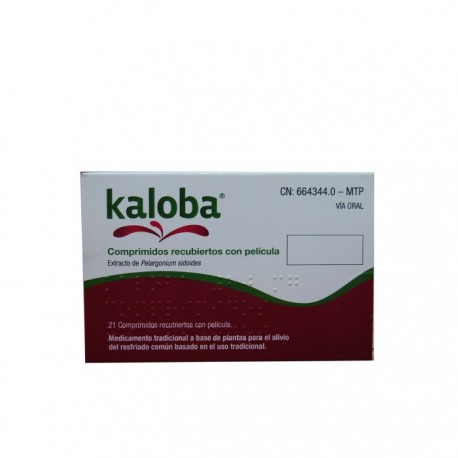

Kaloba 21 Tablets
Indications
- Symptomatic treatment of the COMMON COLD. Its use is based exclusively on traditional use.
Indications
- Symptomatic treatment of the COMMON COLD. Its use is based exclusively on traditional use.
Posology
- Adults, oral:
Oral drops: 30 drops, 3 times a day.
- Children, oral:
Children over 12 years old: Same as adults.
Children 6-12 years: 20 drops, 3 times a day.
Children 2-5 years: 10 drops, 3 times a day.
Children under 2 years of age: Safety and efficacy have not been evaluated.
The treatment lasts 7 days, although it may be used for 2-3 additional days to prevent relapses. Treatments lasting longer than 2 weeks are not recommended.
- Oral drops: The drops can be dissolved in some liquid.
Interactions
- Oral anticoagulants. Pelargonium may enhance the effects of oral anticoagulants. It is recommended to avoid the combination. Pelargonium has been shown not to interact with penicillin V.
Adverse reactions
- Digestive: [NAUSEA], [DIARRHEA], [GASTRIC HYPERACIDITY] and [GASTRALGIA].- Hepatic: [INCREASE IN TRANSAMINASES], although a causal relationship has not been proven.- Allergic: [HYPERSENSITIVITY REACTIONS], with [EXANTHEMATIC ERUPTIONS], [URTICARIA], [PRURITUS]. Rarely, more serious cases have been reported with [SKIN EDEMA], [DYSPNEA] and [HYPOTENSION].- Hematological: [HEMORRHAGE], with [GUM BLEEDING] and [EPISTAXIS].
Advice to the patient
- Do not use for more than 2 weeks in a row.- It is recommended to drink plenty of water and other liquids during treatment.- If fever or difficulty breathing appears, consult your doctor and/or pharmacist.
Overdose
Symptoms: There is no clinical experience with overdose with pelargonium.Treatment: Symptomatic treatment should be instituted.In case of overdose or accidental ingestion, go to a medical centre or consult the Toxicological Information Service, indicating the product and the amount ingested.
Composition
10 g (= 9.75 ml) of solution contains 8.0 g of Pelargonium sidoides root extract (1:8-10) with an ethanol content of 11% m/m. Per tablet: 20 mg of dried liquid extract of Pelargonium sidoides root (1:8-10).
Precautions regarding excipients
- This medicine contains ethanol. It is recommended to check the composition to know the exact amount of ethanol per dose. * Amounts less than 100 mg/dose are considered small and are not usually harmful, especially in children. * Amounts greater than 100 mg/dose may be harmful to people with [CHRONIC ALCOHOLISM], and should also be taken into account in pregnant and lactating women, children, and in high-risk groups, such as patients with [HEPATOPATHY] or [EPILEPSY]. * Amounts greater than 3 g/dose may decrease the ability to drive or operate machinery, and may interfere with the effects of other medications.
Doping
This medicine contains alcohol. It is prohibited to take it during competition in certain sports. Detection will be carried out by breath and/or blood analysis. The threshold for an anti-doping rule violation (haematological value) is 0.1 g/l in the following sports: aeronautics, motor racing, motorcycling, power boating and archery. Alcohol is considered a specific substance and therefore a rule violation involving this substance may result in a reduction of the sanction provided that the athlete can prove that the use of the specific substance in question was not intended to enhance his or her sporting performance.
Contraindications
- Hypersensitivity to pelargonium or any component of the medication.- Severe liver and kidney disease. Safety and efficacy have not been evaluated.- [PEPTIC ULCER]. Possible worsening and increased risk of gastric bleeding.- [COAGULATION DISORDERS], or patients treated with oral anticoagulants. May increase the risk of bleeding.
Precautions
- [HEPATOPATHY]. Elevated transaminases have been reported, although they have not been directly related to pelargonium. It is recommended to use it with caution in patients with liver disease, avoiding it in severe cases (see Contraindications). It is recommended to periodically monitor transaminase levels, and in the event of a significant and unjustified increase, to discontinue treatment. - History of peptic ulcer. Pelargonium has been linked to digestive problems such as gastric hyperacidity and stomach pain. It should also be taken into account that it has a certain capacity to alter coagulation. In patients who have suffered from peptic ulcer in the past, it could promote the appearance of a new erosion, with a greater probability of gastric hemorrhage. Therefore, extreme caution is advised in these patients. If symptoms of gastroduodenal erosion are observed, such as nausea, vomiting, gastric hyperacidity or pain in the epigastric area, it is recommended to discontinue the administration of harpagophyte.- [RESPIRATORY INFECTION]. It could mask symptoms of respiratory infections. If the patient describes fever, dyspnea or purulent sputum, it is recommended to reevaluate the diagnosis.
Pregnancy
There are no adequate and well-controlled studies in pregnant women, so the use of pelargonium during pregnancy is only accepted if there are no safer therapeutic alternatives and the benefits outweigh the possible risks.
Lactation
It is unknown whether the components of pelargonium are excreted in breast milk, and the possible consequences this could have for the infant. It is advisable to stop breastfeeding or avoid its use during breastfeeding.
Children
Safety and efficacy have not been evaluated in children under 12 years of age (tablets) or 2 years of age (oral drops), so it is recommended to avoid its use.
Seniors
No specific problems have been described in the elderly.
Period of validity
20 and 50 ml bottles: 3 months after opening the container. 100 ml bottles: 6 months after opening the container.
Special warnings
- If the patient has fever, dyspnea or purulent sputum, the presence of a respiratory infection will be investigated.

